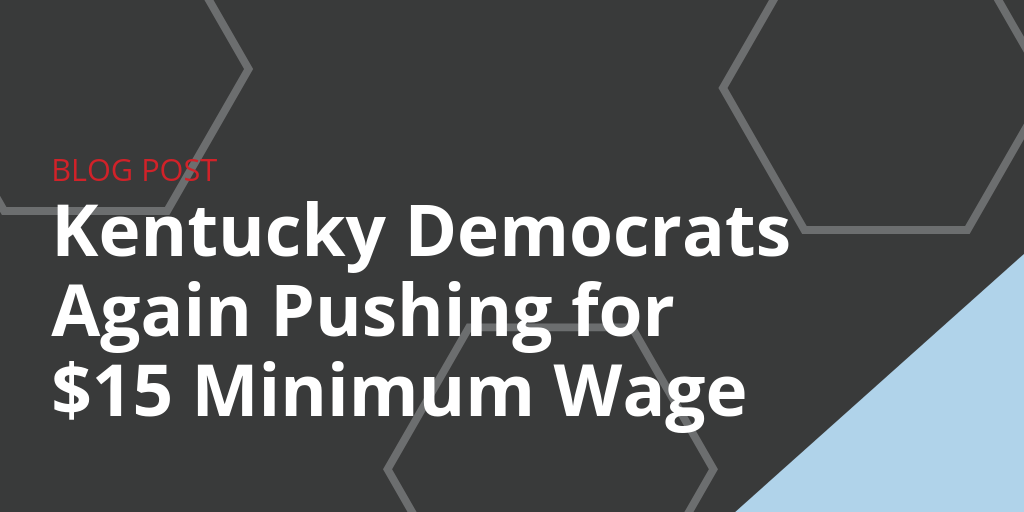LABOR LAW NEWS
Kentucky Lawmakers Again Pushing for $15 Minimum Wage
By Kris Janisch
Published Aug. 22, 2019

The Kentucky lawmakers’ plan calls for gradual increases to Kentucky’s minimum wage, starting with a bump to $8.20 in 2020.
Two Kentucky Democrats are preparing to introduce legislation that would eventually increase the state’s minimum wage to $15 an hour.
If enacted, it would more than double Kentucky’s current minimum wage by 2027. Currently, the state’s minimum wage remains at the federal rate of $7.25. (The federal minimum wage hasn’t increased since 2009.)
Sen. Reggie Thomas and Rep. Kathy Hinkle announced their plans during a joint press conference on Aug. 20. They have pre-filed the bills in their respective chambers. The Kentucky General Assembly reconvenes in January 2020.
Proposed Kentucky Minimum Wage Increases
The lawmakers’ plan calls for gradual increases to Kentucky’s minimum wage, starting with a bump to $8.20 in 2020. Thomas, an attorney and law professor, noted that states contiguous to Kentucky have minimum wage rates above the federal requirement:
- Illinois: $8.25
- West Virginia: $8.75
- Ohio: $8.55
“We want to move Kentucky forward,” Thomas said.
As proposed under the Senate version of the bill, the legislation would make Kentucky’s minimum wage:
- 2020: $8.20
- 2021: $9.15
- 2022: $10.10
- 2023: $11
- 2024: $12.05
- 2025: $13.10
- 2026: $13.95
- 2027: $15
For tipped employees, the rates would be:
- 2021: $3.05
- 2022: $3.95
- 2023: $4.90
All changes would take effect on July 1 each year. (There is some language in the pre-filed bill about a $2.13 minimum wage for tipped employees. But that is already the federal rate.)
However, retail stores and service businesses whose gross revenues are less than $500,000 would not be subject to the Kentucky minimum wage rate under the measure.
“We think that’s a reasonable compromise,” Thomas said.
Attempts to Raise Minimum Wage in Kentucky
Another big part of the proposal is that it would allow cities in Kentucky to set their own minimum wage rates.
About four years ago, Lexington and Louisville passed ordinances to increase minimum wage. Yet the Kentucky Supreme Court in October 2016 struck down the measures, saying cities don’t have the right to set their own wage rates.
The minimum wage bill from Thomas and Hinkle aims to reverse that ruling.
Meanwhile, Thomas has pushed for similar legislation the past two years. And it remains to be seen whether the effort will be successful this time around. The governor is a Republican and the GOP is also in control of the Kentucky General Assembly.
Minimum Wage Laws and the ‘Fight for $15’
It’s possible the effort to raise the minimum wage in Kentucky goes the same way as the attempt at the federal level. Earlier this summer, the U.S. House passed a bill that would eventually increase the minimum wage to $15. But it has yet to gain any traction in the GOP-controlled Senate.
Still, the push for minimum wage increases at the county and city levels continues. St. Paul, Minn., will move to a $12.50 minimum wage in January 2020, along with a host of other jurisdictions. Several others across the country already saw minimum wage increases on July 1, 2019.
Elsewhere, Colorado this spring gave cities the authority to create their own minimum wage rates. The progressive state will likely see new minimum wage ordinances passed in the coming years.
Guide: County and City Minimum Wage Rate Updates – July 1, 2019
Plus, four states earlier this year took steps to eventually make minimum wage $15 an hour.
- Illinois
- Maryland
- New Jersey
- Connecticut
These changes in employment law are just one of several moving targets HR professionals, payroll teams and compliance experts must keep an eye on now and in the future.
This Labor Law News Blog is intended for market awareness only, it is not to be used for legal advice or counsel.
Keep Informed
with GovDocs Labor Law News
Who is GovDocs?
GovDocs simplifies the complexity of employment law management (ELM) for large, multilocation employers across all industries. We offer a suite of innovative compliance products, including labor law postings, data software applications and other program management tools, to ease the day-to-day responsibilities of human resources, compensation, legal and finance teams.
Have less than 30 locations?
The GovDocs Poster Store simplifies the complexity of posting compliance for employers with less than 30 locations across all industries. We offer a variety of posting products to meet your labor law compliance needs, including federal and state posters; county and city poster packages; and other HR posters. Plus, when you purchase posters with GovDocs Update Service, you ensure your locations automatically receive updated posters whenever changes occur.


